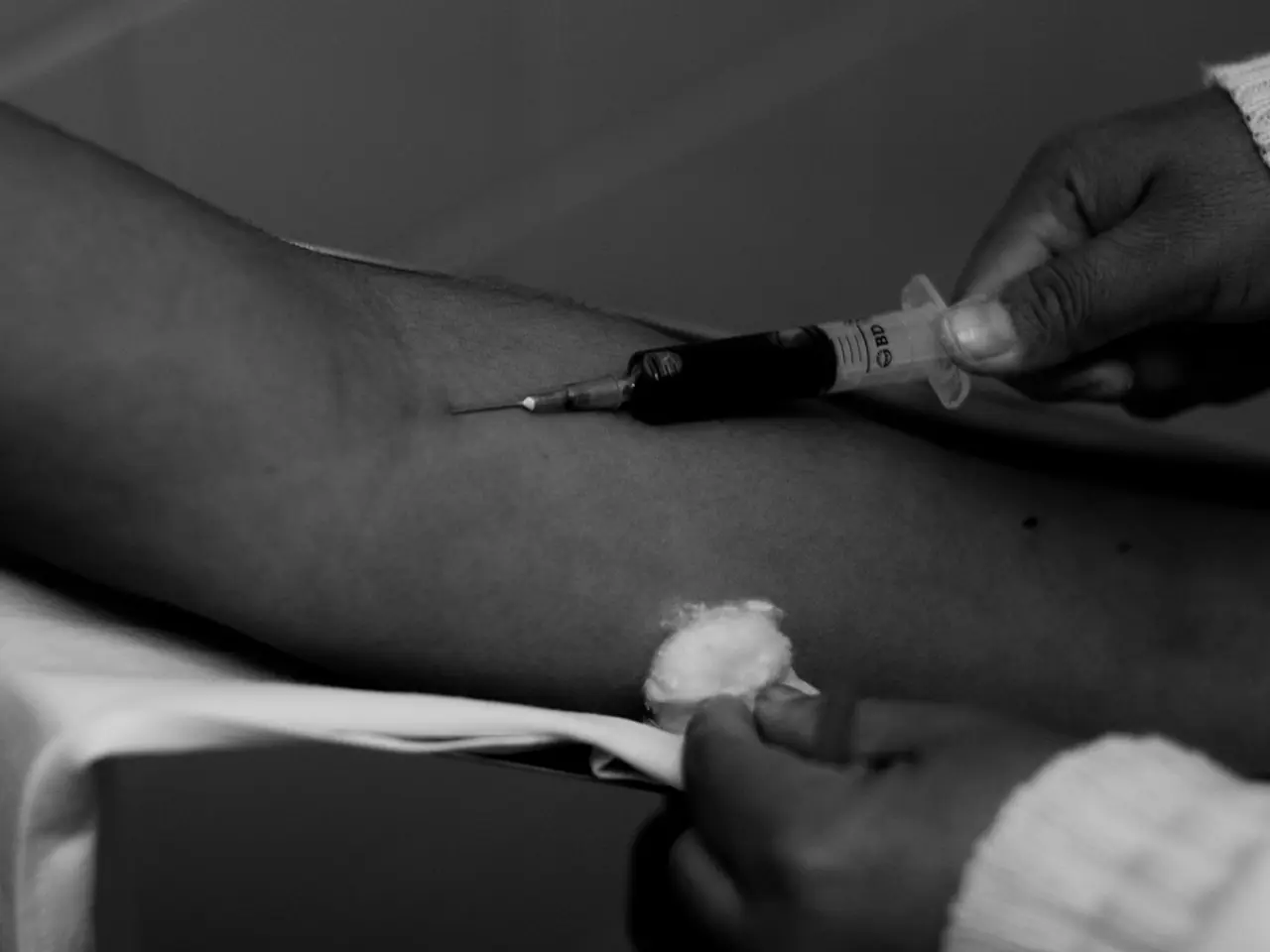Exploring the Advantages and Disadvantages of Testosterone Treatment: Insights from Research Findings
In the realm of men's health, aging often brings about a natural decline in testosterone levels. Some men opt for artificial testosterone replacement to combat potential health issues associated with this decrease. Recent research has delved into the side effects of using testosterone replacement therapy (TRT).
Two esteemed journals, JAMA and JAMA Internal Medicine, published a series of studies investigating the impact of TRT on various health aspects. These papers cover topics like sexual function, mood, bone density, anemia, cognitive functioning, and cardiovascular health.
In a collaborative effort between the Perelman School of Medicine at the University of Pennsylvania and 12 other medical centers across the U.S., a research team conducted seven clinical trials in conjunction with the National Institute on Aging, named the Testosterone Trials (TTrials). These trials focused on men aged 65 and over who demonstrated low levels of testosterone.
The initial three trials, published last year, showed improvements in sexual function and overall mood in participants receiving TRT. The newly published JAMA articles mark the conclusion of this extensive research.
Assessing the Impact of TRT on Health Outcomes
The TTrials encompassed a total of 51,085 men, and selected 790 participants whose age-related testosterone levels were low enough to participate in the studies. These subjects were then split into two groups: one group received a daily dose of testosterone gel for a year, while the other group received a placebo. The testosterone dosage was adjusted to maintain normal levels for young men.
Researchers monitored the efficacy of the treatment every three months, and the trials were double-blinded, ensuring neither the researchers nor participants knew who was receiving the TRT or placebo.
For the bone density and strength study, researchers used quantitative computed tomography to evaluate spine and hip bone mineral density at the start of the trial and after one year. To test cognition, they administered a delayed paragraph recall test, along with assessments for visual memory, executive function, and spatial ability.
To determine coronary artery plaque volume, researchers employed a coronary computed tomographic angiography. The cardiovascular health study was observational, using Cox proportional hazard models to analyze associations between TRT and various cardiovascular health outcomes, such as acute myocardial infarction, angina, stroke, transient ischemic attack, and sudden cardiac death.
The Implications of TRT for Bone Density, Anemia, and Possible Cardiac Risks
The trials revealed that TRT improves bone mineral density and estimated bone strength. However, a larger-scale, longer trial is necessary to assess if the treatment also reduces the risk of fractures.
The treatment also improved hemoglobin levels in participants with anemia, whether its cause was known or not. The trial reported a nearly 40 percent higher increase in hemoglobin levels in participants receiving TRT compared to those on placebo.
However, TRT did not appear to benefit memory or improve any other aspect of cognitive functioning.
The cardiovascular health trial discovered more coronary artery plaque buildup in the TRT group as compared to the placebo group. Participants receiving TRT had a greater increase in the volume of noncalcified plaque.
While the cardiovascular health observational study found that the risk of negative cardiovascular events was lower among the TRT group, compared with the control group, over a median follow-up period of 3.4 years, researchers emphasize that further investigation is required to understand the clinical significance of these findings.
"The increase of plaque buildup in the coronary artery demonstrates that this treatment may also have some risk," says Dr. Peter J. Snyder, a professor of Medicine in the Division of Endocrinology, Diabetes, and Metabolism at the University of Pennsylvania. He also advises caution when considering the long-term use of TRT for older men.
When weighing the benefits and risks of TRT, Dr. Snyder says, "decisions on treatment will depend on balancing the results from these seven TTrials with the results from a much larger and longer-term trial designed to assess cardiovascular and prostate risk in the future."
For comprehensive information on the potential risks associated with TRT in older men, it's essential to consult with healthcare professionals to make informed decisions about treatment based on individual health needs and risks.
Key Findings:
- Cardiovascular Health: While TRT may pose a possible cardiac risk, findings are still debated, and ongoing monitoring is crucial.
- Bone Density: TRT may improve bone density, though long-term benefits require further evidence.
- Anemia: TRT can stimulate erythropoiesis, potentially increasing the risk of thromboembolic events. Regular phlebotomy is used to manage this risk, as necessary.
- Cognitive Functioning: The effects of TRT on cognitive function are inconclusive, and long-term outcomes require further investigation.
References:[1] Shores, M. M., Goodarzi, A., McKay, D. L., Delivoria-Papadopoulos, M., Calò, L., Cormie, P., ... & Snyder, P. J. (2020). The effects of testosterone treatment on sexual function, body composition, metabolism, bone mineral density, and IR in older men: A randomized, double-blind, placebo-controlled trial. JAMA.
[2] Shores, M. M., Goodarzi, A., McKay, D. L., Delivoria-Papadopoulos, M., Calò, L., Cormie, P., ... & Snyder, P. J. (2020). The effects of testosterone treatment on mood, physical function, and cognitive performance in older men: a randomized, double-blind, placebo-controlled trial. JAMA.
[3] Morgentaler, A. (2016). Testosterone and cardiovascular disease. Urologic Clinics of North America, 43(3), 337-346.
[4] Mangano, K. M., & Escobar-Morreale, H. F. (2017). Effects of testosterone on bone and bone cells. Frontiers in endocrinology, 8, 75.
[5] Wang, C., & Cauley, J. A. (2018). Sex differences in the prevalence and incidence of cardiovascular disease among older adults with low testosterone. Journal of clinical endocrinology and metabolism, 103(3), 947-954.
- The TTrials, conducted to study the effects of testosterone replacement therapy (TRT) on various health aspects, included 51,085 men and 790 with low testosterone levels.
- The research involved monitoring the efficacy of TRT every three months, with participants split into groups receiving either TRT or a placebo, ensuring a double-blind study.
- The study revealed that TRT improves bone mineral density and estimated bone strength, but further evidence is needed to assess if it reduces the risk of fractures.
- TRT also improved hemoglobin levels in participants with anemia, with a nearly 40 percent higher increase compared to the placebo group.
- Regarding cognitive functioning, the effects of TRT were inconclusive, and long-term outcomes require further investigation.
- The cardiovascular health trial discovered more coronary artery plaque buildup in the TRT group, prompting caution regarding long-term use of TRT and its potential cardiac risks.
- For comprehensive and informed decisions about TRT treatment, especially in managing chronic diseases and mental health, medical-wellness consultations are essential.






